- Home
- Keith R. A. DeCandido
Worlds of Star Trek Deep Space Nine® Volume Three Page 26
Worlds of Star Trek Deep Space Nine® Volume Three Read online
Page 26
“I don’t think it worked,” Kira observed, a hint of sarcasm in her voice.
“No, it didn’t,” Odo agreed. “It only made her pity humanoids for their inability to link with each other, for the inherent isolation of their relationships. I think it also cemented her view of changelings as superior beings.”
Kira laughed once, sharply and without humor. “I don’t know why you expected anything different.”
“But I did expect something different,” Odo said at once. He sat down on the storage bin again. “I expected to be able to demonstrate to her the joys that humanoids can share among themselves, and that, even if not in quite the same way, we can still share in those joys as well.” Although Odo had never had a romantic relationship with Kira, he had been involved with a woman named Arissa. “I wanted the Founder to know what…completed me…as an individual,” he went on, “just as she showed me what helped to complete the lives of changelings. My relationships with humanoids…with you, for example…are important parts of my life, and something I need.” He stopped, unsure if his words accurately expressed his feelings. He leaned forward, his hands on his knees. “Do you understand?” he asked Kira.
“I don’t know if I do,” she said.
“What is it that makes you whole?” he asked. “What is it that helps to complete your life in a way that you could not do without?”
“I lived under the brutal oppression of the Cardassians for most of my life,” she said. “I can do without a lot of things.”
“I know you can,” Odo acknowledged. He sat back up, automatically giving her space with her memories. “But what would you prefer not to do without?” he asked, knowing what Kira’s response would be: her faith in the Prophets. Devout without being judgmental of those who did not share her beliefs, Kira attended Bajoran shrine services frequently, and prayed to her gods in private even more often.
But she surprised him with her answer. “For a time, it was Bareil,” she said, obviously speaking of her romance with the Bajoran vedek, a romance that had ended with his death several years ago. “And then Shakaar,” she said, naming the Bajoran first minister with whom she’d subsequently had a relationship.
Startled by the response, Odo felt an anxious surge of anticipation. He both dreaded and relished the opportunity to talk with Kira about love. While discussion of such personal matters had always been difficult for him, he also knew that it could be different with Kira—he could be different with her. But in addition to whatever normal risks attended addressing issues of the heart with Kira, doing so now could derail the reason they’d come together to talk in the first place: to deal with what had come between them, and still stood in the way of their friendship. He needed to explain to her why he’d done the things that had consequently caused the rift between them, and he could not do that by speaking of romance or the deeper feelings he had for her.
“I thought you would mention your faith in the Prophets,” he told her.
“You asked what I would prefer not to live without,” Kira said. “But my faith in the Prophets is something that couldn’t possibly be taken away from me.”
“What if you learned that the Prophets were not gods?” he asked. “That they were simply alien beings with an interest in the Bajoran people?”
Although he’d seen it displayed often, it still awed him to witness Kira’s sure knowledge of the divinity of the Prophets, and her unwavering belief that they would always take care of Bajor and its people. She had lived the first quarter-century of her life during a military occupation of her planet, had been robbed of a childhood, had seen family and friends tortured, maimed, and killed, and she now functioned as a soldier in the massive, devastating war with the Dominion. And yet through all of that, her trust and faith in the Prophets had not only endured, but flourished. She’d been right to contend that her beliefs could never be taken from her, but that also reinforced the point that he wanted to make: that her faith contributed to who she was, to what defined her, and to what made her life complete.
Odo did not share Kira’s beliefs in the godhood of the aliens that existed within the Bajoran wormhole, but he surely recognized their influence on her life, and those of other Bajorans. And for the first time, he wondered why the Great Link had no such beliefs, and what it would mean to them if they did.
5
“And the Great Link sent out the Hundred,” Odo said, “to lure the Progenitor to return.”
Laas stared at him from across the islet, his face a mask of either confusion or disbelief, Odo could not tell which. “The Progenitor,” Laas said, as though about to offer an observation, but then he peered down at the ground and said nothing more. The pervasive quiet of this world settled around them, the perpetually vesper sky enfolding them like a soft cloak.
Odo had just finished describing his encounters with Indurane, detailing all of the information that the ancient Founder had imparted to him. After Indurane had been carried from the islet by the changeling tide, Odo had returned to the Great Link himself to search for Laas. When he’d located him, the two had linked, and Odo had begun to share the knowledge he’d just been given. But Laas had before long broken their connection and come here. After two centuries of communicating via the spoken word, Laas sometimes still found it easier to assimilate information in that way; as Odo himself understood, joining with another changeling could be an overwhelming experience—physically, mentally, and emotionally—making it more difficult to process data newly learned.
Odo waited, allowing Laas time to consider what he’d been told. When finally he looked back up, his expression had transformed into one of disgust. “Belief in a First Cause is such a…monoform…concept,” he said, his isolation of the word an obvious sign of his contempt for non-changeling life-forms. Despite Laas’s prejudices, though, Odo had to agree with his conclusion.
“That’s been my experience as well,” he said, recalling his conversation with Nerys in Dax’s closet, during which he’d for a moment conjectured to himself about what a Founder god or gods might be like, and about what such a concept might mean to his people. The notion had seemed fantastical at the time, even frivolous. If anything, the Great Link had set itself up as a collection of gods for many of its Dominion subjects—most notably for the Vorta and Jem’Hadar.
Still, Indurane’s beliefs had seemed to be more than simply matters of faith. Odo said as much to Laas, and then elucidated his point. “Indurane actually conveyed recollections of the Progenitor,” he said, ‘’although his memories were old and indistinct. But I perceived his beliefs more as issues of fact than of conviction.”
“Is that not always the way it is?” Laas asked. “Are not the so-called religious experiences of monoforms simply the result of certain electrochemical processes in their brains?”
Odo grunted, taking a look out at the constantly moving body of the Great Link. “Changelings don’t have monoform brains,” he said.
“That’s not my point,” Laas said, and he walked over to Odo, skirting the ashes of the dead Founder still piled in the center of the islet. “Isn’t the belief in a god most often a reaction to the fear of death, a way for an individual to cope with the limitations of their life? And this ancient changeling told you that our people cannot reproduce. Even if we are long-lived by monoform standards, we are also not immortal. That means that not only will individual changelings die over time, but eventually, so too will the entire Great Link.”
Odo looked at his fellow Founder, his fellow member of the Hundred, and tried to separate the reason in Laas’s arguments from the contemptuous perspective from which he viewed humanoids. “You’re suggesting that the Progenitor is not a matter of fact, but one of belief only, and essentially a means of coping with the ultimate extinction of the Founders?”
“I am saying that, yes,” Laas confirmed.
“I don’t know,” Odo said. “Would the Great Link exile one hundred of its own kind, solely on the basis of belief?” The idea horrified him.
“The history of the Varalans is littered with barbarous episodes,” Laas said, speaking of the humanoid civilization with whom he’d lived for two hundred years. “They often utilized their faith in the existence of an omnipotent, omniscient creator and savior as justification for heinous behavior, for cruel acts of savagery against even their own kind. The same story is true of many monoform races.”
“But the Varalans and those other species are not changelings,” Odo protested.
“No,” Laas allowed, “and it pains me to think that our people can be compared to such inferior beings. And yet you’ve told me that the Founders sent out the Hundred based upon an absurd belief in a creator, a belief motivated by a fear of communal death.”
“Indurane maintains that it is more than belief, more than faith,” Odo said. “According to him, it’s reality.”
“That is what believers say,” Laas contended.
“Except that Indurane thinks that the Great Link has succeeded,” Odo said, divulging the final piece of information that the aged Founder had divulged to him.
“What?” Laas asked, clearly surprised. He took a step closer to Odo, almost coming into contact with him. Odo thought that Laas might reach out at any moment in order to link with him.
“The Great Link thinks that the scattering of the Hundred throughout the galaxy has brought about the result for which it was intended,” Odo said. “They believe that the Progenitor has come back to them.” He remembered the great anticipation and anxiety he’d perceived in his people recently, feelings which he’d ascribed to his own return from the Alpha Quadrant, and then to Laas’s bringing home two more of the Hundred, and finally to the revelation of the death of a Founder. But he saw now that such collective emotions could also be explained by the belief that the Progenitor had returned.
“Why do they think that?” Laas wanted to know, a question Odo had been asking himself ever since Indurane had revealed the information to him. “If that’s true, then where is the Progenitor?”
“I don’t know,” Odo said slowly, and he visualized all of the shapes Indurane had become in response to his questions. But suddenly, his investigative experience and skills told him that he had been asking the wrong questions. Indurane had explained what the Great Link had done in sending out the Hundred, and why it had done so, and even when. But Odo understood now that he needed to know other things: Where had they sent the Hundred, and to where did they think the Progenitor had returned?
He looked back at Laas. “We need to contact Weyoun,” he said.
As Taran’atar stood before Rio Grande’s port hatchway, waiting for Ananke Alpha’s shuttlebay to finish pressurizing, a calm clarity overtook his mind, like the break of day enveloping a suddenly still battlefield. He felt as he often had on the cusp of military action. I am dead, he thought, reciting to himself the dictum of a Jem’Hadar first about to take his men into combat. He continued by altering the rest of the philosophy to fit the circumstances: I go to visit the Founder to reclaim my life; I do this because I am Jem’Hadar.
The litany, though skewed, seemed to Taran’atar as appropriate as ever—and perhaps even more apposite than usual. He hadn’t felt in possession of his own life for some time now, ever since Odo had assigned him to reside alongside inhabitants of the Alpha Quadrant aboard Deep Space 9. Although in that time he’d employed his martial abilities on occasion, and although he’d filled much of the substantial downtime with numerous training exercises, it often felt as though his existence as a Jem’Hadar soldier had ended. The necessity for him to sleep—a feeble attribute shared by weaker species—underscored that characterization.
An indicator light beside the hatchway blinked from amber to green, signaling that the pressurization of the shuttlebay had completed. Taran’atar worked an adjoining control, and the hatch slid open. Before stepping forward, though, he glanced over his shoulder at Kira, who sat at Rio Grande’s primary console. Since no waiting rooms or guest quarters had been built into the prison, she would be required to remain aboard the runabout during his time inside.
Looking at her now, Taran’atar saw that in one hand she still held his kar’takin. After Rio Grande had set down aboard Ananke Alpha an hour ago, they’d prepared to disembark, but then had been instructed to wait while the facility’s staff had utilized sensors to scrutinize the runabout and its passengers. During that period, Taran’atar and Kira had been apprised of the prison’s rules and procedures, which had been few, specific, and strict. One regulation prohibited visitors from carrying anything inside, including not only weapons, but even equipment such as tricorders and medkits. Taran’atar had therefore disarmed himself, handing his blade over to Kira as he’d prepared to depart.
“Good luck,” she said now, peering back at him from the bow of the runabout. “I hope you get what you came here for,” she went on, though even the smile she offered could not camouflage her trepidation about his imminent visit to the Founder. Had it been her decision whether or not to allow such a meeting, he doubted that he would have been here right now. He had told her, and then told Admiral Ross, that he wished to call on the Founder in order to check on her well-being, and also because she’d been alone since the end of the war, segregated not only from the Great Link, but also from any members of the Dominion; he hoped that his presence might help relieve her isolation, however briefly. In truth, Taran’atar also sought his own relief, wanting the view of another Founder about the mission Odo had assigned him, as well as any assistance he could get about resisting his body’s new requirement for sleep.
He stepped from the runabout and walked along a red line on the decking, as he’d been instructed. On the way, he noted several surveillance and sensor ports, as well as what appeared to be phaser emitters, security obviously considered a premium commodity here. He also assumed that the facility had been outfitted with transporter inhibitors. Following the guide line, he headed toward the lone door in the shuttlebay, located in the inner bulkhead. The solid panel retracted at his approach, and he continued on into a long corridor.
As the door closed behind him, another opened up ahead. He passed a closed door in the bulkhead to his left, and moved through the open doorway into a large, square room, perhaps ten meters on a side. Empty but for a small free-standing partition off to the right, the room possessed few other features: more surveillance, sensor, and weapons ports; the door through which he’d entered and one opposite; a continuation of the red line connecting the two; and a long window in the bulkhead to his left. He surmised the gray, metallic walls of the room to be constructed of rodinium or tritanium. Through the window—which appeared to be a thick slab of transparent aluminum—he saw several monitors and control panels, and he counted five security officers, all clad in Starfleet uniforms. Two appeared to be human, one Vulcan, one Orion, and one Tellarite.
“Mr. Taran’atar,” a female voice said via a comm system, the words coincident with the moving of the Vulcan officer’s lips. He made eye contact with her as she spoke. “I am Commander T’Kren. I am required by the United Federation of Planets to inform you that this facility has been deemed a no-hostage zone. In the event that you are taken captive by Ananke Alpha’s prisoner, or by forces attacking this facility, Starfleet will not negotiate for your release. Do you understand and consent to these conditions for your visit?”
“Yes,” Taran’atar said.
“Then behind the screen to your right,”’ she continued, “you will find a Starfleet-issue coverall. Please step behind the screen, remove the apparel you are currently wearing, and dress in the Starfleet attire. Please do this with alacrity.”
Taran’atar would have removed his clothing immediately, but recalled an admonition he and Kira had been given aboard the runabout: while within the confines of Ananke Alpha, follow all instructions precisely, or be stunned with phaser fire into unconsciousness and removed from the facility. “Acknowledged,” he said, and did as he’d been told, switching the black coverall he wore for th
e bright red one he found hanging behind the screen. He noted the closeness of the fit, and assumed that the outfit had been replicated for him after he and Kira had been scanned aboard the runabout.
He emerged from behind the screen less than twenty seconds after he’d moved behind it, leaving his black coverall on the decking. He saw only three security officers through the window now.
“Thank you,” the Vulcan commander said, her politeness in this situation evocative of the unctuous nature of the Vorta. “Please move to the approximate center of the room.” Once he had done so, she continued to issue instructions. “In a moment, you will be joined by two security officers who will escort you to the cell housing the Founder. One will walk ahead of you, the other behind you. Please follow their instructions exactly. Do you understand?”
“Yes,” Taran’atar said, barely able to contain the contempt he felt for these people who dared to believe that they had the right to imprison a god.
“Once you have entered the Founder’s cell, you will have one hour to visit with her,” the Vulcan officer went on. “At the end of that time, you will be escorted back here. Do you understand?”
“Yes,” Taran’atar said again, careful not to let the strong emotions he felt show on his face. He would do nothing to risk his meeting with the Founder.
The inner door opened, and two of the security officers he’d earlier seen through the window entered the room. One, an Orion male, moved quickly over to the outer door, now closed. He stood not even a meter and three quarters, with short, muscular legs, a wide chest and shoulders, and brawny arms. He had dark eyes and short black hair. The appearance of the other officer, a human female, contrasted significantly with that of the first; tall and lean, she had light coloring, shoulder-length blond hair, and narrow features. Both officers had small black pouches attached to their uniforms at the waists, and both held hand phasers at the ready.

 Alien
Alien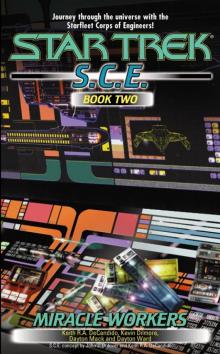 Miracle Workers
Miracle Workers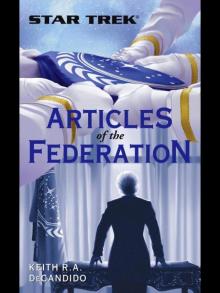 Articles of the Federation
Articles of the Federation Supernatural Heart of the Dragon
Supernatural Heart of the Dragon War Stories: Book Two
War Stories: Book Two The Zoo Job
The Zoo Job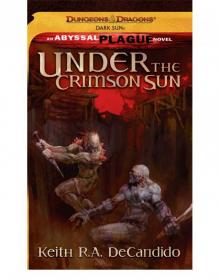 Under the Crimson Sun
Under the Crimson Sun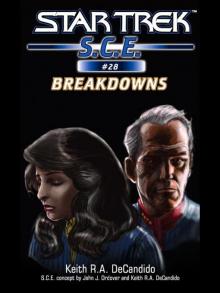 Breakdowns
Breakdowns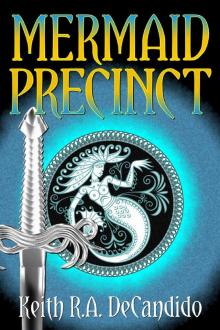 Mermaid Precinct (ARC)
Mermaid Precinct (ARC) Supernatural 1 - Nevermore
Supernatural 1 - Nevermore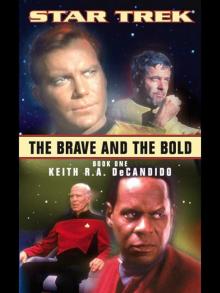 STAR TREK - The Brave and the Bold Book One
STAR TREK - The Brave and the Bold Book One Four Walls
Four Walls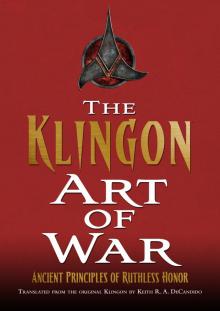 The Klingon Art of War
The Klingon Art of War Blackout
Blackout War Stories: Book One
War Stories: Book One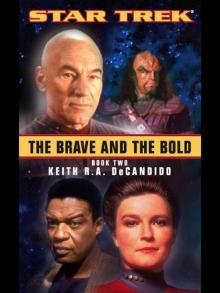 The Brave and the Bold Book Two
The Brave and the Bold Book Two Honor Bound
Honor Bound Sleepy Hollow: Children of the Revolution
Sleepy Hollow: Children of the Revolution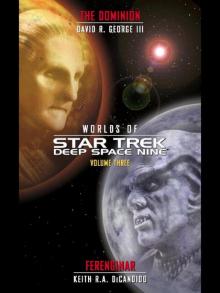 Worlds of Star Trek Deep Space Nine® Volume Three
Worlds of Star Trek Deep Space Nine® Volume Three Star Trek: TNG: Enterprises of Great Pitch and Moment
Star Trek: TNG: Enterprises of Great Pitch and Moment Genesis
Genesis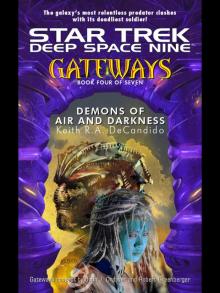 Demons of Air and Darkness
Demons of Air and Darkness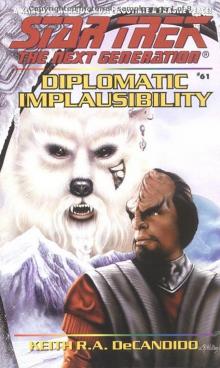 Star Trek - TNG - 61 - Diplomatic Implausibility
Star Trek - TNG - 61 - Diplomatic Implausibility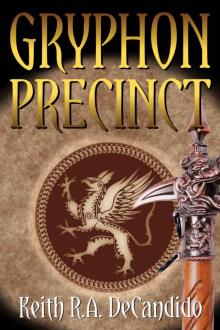 Gryphon Precinct (Dragon Precinct)
Gryphon Precinct (Dragon Precinct)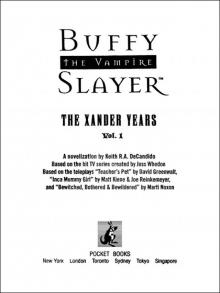 THE XANDER YEARS, Vol. 1
THE XANDER YEARS, Vol. 1 Nevermore
Nevermore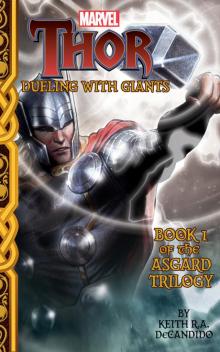 Thor
Thor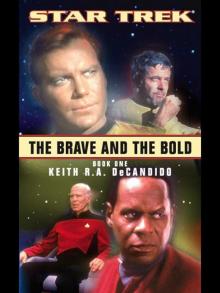 The Brave And The Bold Book One
The Brave And The Bold Book One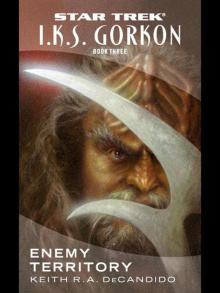 I.K.S. Gorkon Book Three
I.K.S. Gorkon Book Three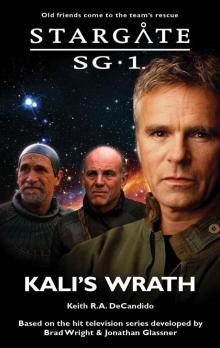 STARGATE SG-1: Kali's Wrath (SG1-28)
STARGATE SG-1: Kali's Wrath (SG1-28) Bone Key
Bone Key Guilt in Innocece
Guilt in Innocece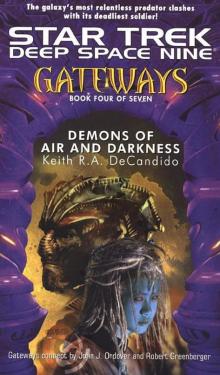 Star Trek - DS9 Relaunch 04 - Gateways - 4 of 7 - Demons Of Air And Darkness
Star Trek - DS9 Relaunch 04 - Gateways - 4 of 7 - Demons Of Air And Darkness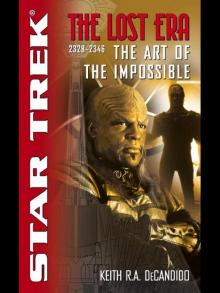 The Art of the Impossible
The Art of the Impossible I.K.S. Gorkon Book One: A Good Day to Die
I.K.S. Gorkon Book One: A Good Day to Die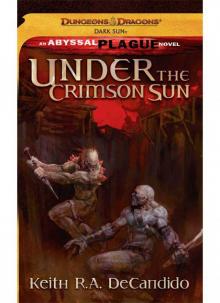 Under the Crimson Sun (the abyssal plague)
Under the Crimson Sun (the abyssal plague)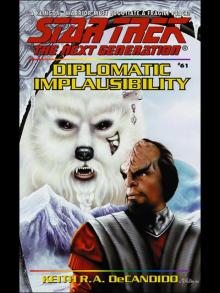 DIPLOMATIC IMPLAUSIBILITY
DIPLOMATIC IMPLAUSIBILITY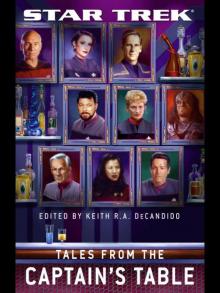 Tales from the Captain's Table
Tales from the Captain's Table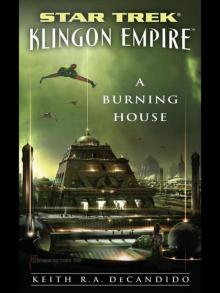 A Burning House
A Burning House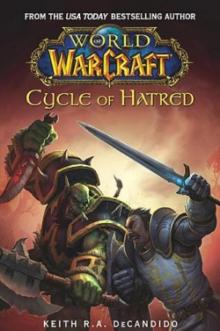 Cycle of Hatred (world of warcraft)
Cycle of Hatred (world of warcraft)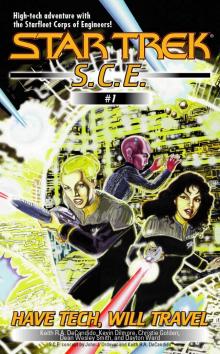 Have Tech, Will Travel
Have Tech, Will Travel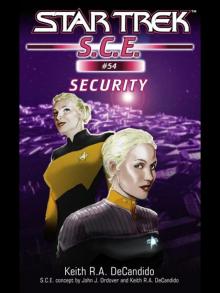 Security
Security